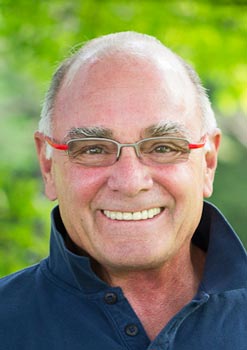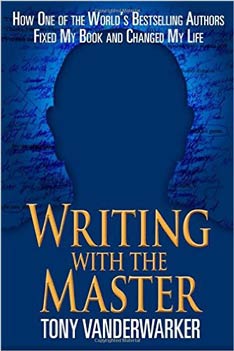Please welcome guest author Tony Vanderwarker, who has generously shared his experience studying writing under his mentor, best-selling author John Grisham.
A while ago, having been asked to introduce friend and neighbor John Grisham at a writers’ retreat, I took the opportunity to give the audience a peek into John’s incredible plot development machine. As I pulled back the curtain to reveal what I’d learned when he’d mentored me in writing a novel, I found myself on a different footing with the famous author. Not that I had progressed to fame and fortune, but I had a book under contract and I sensed for the first time how much progress I had made.
John and I had been friends since our sons played high school football together. While traveling together and sharing holidays, we often talked about his writing but seldom about mine as there was little to talk about. Occasionally he’d ask, “How’s your writing going?” and I’d have to give him some stiff upper lip kind of answer, like “Going fine, just started a new one,” when the truth was that my stack of rejection notices was getting so tall, it was threatening to topple.
John had been through the rejection nightmare himself a couple times, so he knew the territory. Both A Time to Kill and The Firm
(aff links) were turned down repeatedly. His agent finally found a small house for A Time To Kill, but it ran into financial problems and couldn’t fund any promotion, so the novel died a slow death and Grisham reverted to peddling it out of the trunk of his car. And The Firm only attracted attention from publishers after an auction for the movie rights.
At the halftime of one football game, out of the blue John asked me, “You doing okay with your agent?” I shrugged and said, “He’s a young guy—not so sure he knows his way around the biz too well.” John immediately offered, “Be glad to give you an introduction to my agent.”
I jumped at the chance, unaware that I was about to set off on a journey riddled with the deceptively sweet highs of feeling as though I were about to “make it”—maybe big—and the dreadful, sugar-crash lows of disappointment.
John’s agent, David Gernert, said he’d be glad to take a look at my latest novel. You could have scraped me off the ceiling. My imagination fired up visions of auctions with publishing houses vying for my book: six-figure advances and movie deals. I was on cloud nine and ready to crack open the champagne.
A month later, my manuscript passed the first test: one of Gernert’s underlings, all atwitter after reading it, said he loved it. I finally felt like the door to the inner sanctum of published authors was slowly cracking open for me. I was close to shaking the “unpublished author” curse. Certainly nowhere near Grisham, who was on his tenth novel, but moving out from under the black cloud.
Then came the first crash: Gernert gave it a second read and decided to pass. “If it’s any consolation,” he told me, “this is the first time this office has been split on a submission.” Close only counts in hand grenades, I thought to myself, back under the black cloud again.
I struggled along for another couple of years, cranking out two more novels and adding to my pile of “We’re sorry, but your novel yadda-yadda-yaddas.” Then one day at lunch, after asking how my novel writing was going, John said, “Be glad to help you, kind of mentor you, if you’d like.”
Another high: I practically fell off my chair and accepted his generous offer. For the next two years, John took me under his wing and taught me his plot development techniques. Outlining furiously under John’s exacting eye, I thought, I’ve got a bestseller going. I can feel it. My imagination went haywire. I daydreamed I was on the set of The Today Show, chatting about what it’s like to write a novel with John Grisham. Maybe John will join me? How big of an advance would I get? Will there be a Porsche Turbo in the offing? Who’s going to star in the movie version of my book? Harrison Ford, maybe? Will I be asked to write the script?
But John made it crystal clear that he would be a taskmaster, too, saying, “The best advice is based on brutal honesty.”
And brutal he was. He rejected my first outline right off the bat: “Throw it out. Start over,” he told me, “takes too much ink to get it going.”
As a friend, John’s chummy and jovial, but as a mentor, he pulls no punches, lets me have it smack in the face when he sees fit. He put me through a year of writing outlines before I could write Word One of the novel. He even made me feel like a complete dunce at times, like I was back in the fourth grade, sending me back to rewrite outline after outline. While I gained more and more appreciation for his plot development acumen, I realized how totally inept I was in comparison.
Slowly, I got the hang of it. By the time I started writing the actual novel, I felt pretty perky and confident—riding toward a high once again.
That only lasted as long as it took me to finish the first draft. “Scorched earth” is what Grisham reduced it to. He savaged it, and while he didn’t say it, the theme running through his critique was, “You dummy, Vanderwarker, didn’t you listen to a word I said?”
“Take a year rewriting it,” he said, not hiding the disdain in his voice. He may as well have sent me to the crematorium.
I was crushed. At a particularly low point, I considered caving and giving up, the uphill seemed so steep. Fortunately, I had a week to lick my wounds before I ran into John again. “How you doing?” he asked. “I dinged you pretty bad.”
“Did sting a bit,” I said, in what must be a new level of understatement.
“Yeah, I know the feeling. Every time my wife or agent marks up my pages, I want to punch them in the nose. But the problem is, they’re usually right.” It’s some solace that John know what its like to be in the dumper.
When I finished the novel, John was less than enthusiastic. “Vastly improved,” is what he told me. What’s worse, I sensed he lost confidence in me as a fiction writer. A grade of C from Grisham was not going to get me to the big time. Dreams dashed, I was also bummed that I had let my buddy down. The message was clear: Hang up the laptop. So for three years, I did.
Then I got the idea to write a memoir about penning a novel with John. I figured out how to do it using the techniques John taught me. I got John’s permission to use his stuff, knocked it out, and found an agent who enthusiastically took it on. I sent it to Grisham and he liked it. “Really enjoyed it,” he emailed me. “You’re much better at writing non-fiction than fiction.”
“Wow! ‘Mikey likes it,’” I thought, the quirky expression of ultimate relief and amazement jumping back from my past in advertising.
Now with the memoir coming out in early 2014, I’m once again on solid ground, sugar levels steady—at least for now.
As I stood in front of the audience, giving my spiel about writing with John, I cracked a few jokes and told a funny anecdote about the experience. I had them eating out of my hand. As I looked out of the corner of my eye, I saw Grisham smiling.
I wondered, Is John thinking, ‘How do you like that? Vanderwarker finally put it together?’
I’ll have to ask him someday.
 About the Author: Founder of one of Chicago’s largest ad agencies, Tony Vanderwarker is author of the memoir Writing with the Master: How One of the World’s Bestselling Authors Fixed My Book and Changed My Life about his experience being mentored by John Grisham while writing the thriller Sleeping Dogs (aff links). He has also penned the forthcoming novels Ads for God and Say Something Funny. More about Tony can be found at TonyVanderwarker.com.
About the Author: Founder of one of Chicago’s largest ad agencies, Tony Vanderwarker is author of the memoir Writing with the Master: How One of the World’s Bestselling Authors Fixed My Book and Changed My Life about his experience being mentored by John Grisham while writing the thriller Sleeping Dogs (aff links). He has also penned the forthcoming novels Ads for God and Say Something Funny. More about Tony can be found at TonyVanderwarker.com.





Oh, how right you are. This weekend we were in San Antonio as my daughter graduated from BMT with the Air Force, and I was talking to one of her wingmen about writing. She thought critique groups sounded like fun. “No,” I said, “they’re really not. Writing is hard work.”
I also find the learning process of writing curiously like my daughter’s BMT experience, only much longer. And you get to sleep later.
Beth; You bet, took me a long time to get my writing legs and though it’s easier now, it’s still the hardest thing I’ve ever done (except for singing, I can’t help but sounding like a tone deaf frog)!
Great story! Wow… working with John Grisham?! Amazing! But it sounds like it was crazy hard. And I thought critique groups were bad! Getting slammed by Grisham doesn’t sound fun.
I wonder what kind of outlining process you went through for this post. 🙂
Nice story here. Sometimes we just need to repeat this process until the “aha, I get it now” (which is itself merely a milestone and not the final destination because the process will repeat again).
But I’m sure you’ll go back to fiction again at some point, right?